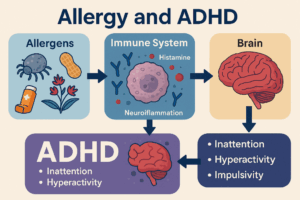Allergy and ADHD: Is There a Connection?
 Attention-Deficit/Hyperactivity Disorder (ADHD) is one of the most common neurodevelopmental disorders, affecting children, adolescents, and adults worldwide. Increasingly, researchers are examining whether allergies and immune responses may play a role in ADHD symptoms. Could the same immune dysregulation that drives allergic conditions also influence attention, hyperactivity, and behavior?
Attention-Deficit/Hyperactivity Disorder (ADHD) is one of the most common neurodevelopmental disorders, affecting children, adolescents, and adults worldwide. Increasingly, researchers are examining whether allergies and immune responses may play a role in ADHD symptoms. Could the same immune dysregulation that drives allergic conditions also influence attention, hyperactivity, and behavior?
This article reviews the evidence linking allergies and ADHD, the possible biological pathways, and what it means for treatment.
1. Allergy and ADHD: What the Research Shows
-
Children with allergic conditions such as asthma, allergic rhinitis, eczema, and food allergies have been reported to have higher rates of ADHD compared to peers.
-
A 2021 meta-analysis found that allergic diseases were associated with a 30–40% higher risk of ADHD.
-
The relationship is bidirectional: children with ADHD may also have higher prevalence of allergy, possibly due to shared genetic or environmental vulnerabilities.
2. Biological Mechanisms Linking Allergy and ADHD
Several overlapping biological pathways may explain the association:
a) Immune Activation and Neuroinflammation
-
Allergic diseases involve chronic immune activation with elevated cytokines (IL-4, IL-6, TNF-α).
-
These inflammatory molecules can cross the blood–brain barrier, influencing dopamine and glutamate pathways crucial for attention and impulse control.
b) Histamine Dysregulation
-
Histamine is not only a mediator of allergy but also acts as a neurotransmitter in the brain, modulating wakefulness, attention, and arousal.
-
Altered histamine signaling could contribute to both allergic reactivity and ADHD symptoms.
c) Sleep Disturbance
-
Allergic rhinitis, asthma, and eczema often impair sleep quality.
-
Poor sleep is strongly linked with worsening inattention, hyperactivity, and mood dysregulation in ADHD.
d) Shared Genetic and Environmental Factors
-
Certain genetic polymorphisms may predispose to both immune hypersensitivity and ADHD.
-
Environmental exposures (prenatal smoking, early infections, diet) can contribute to both allergic disease and ADHD development.
3. Food Allergies, Sensitivities, and ADHD
-
Some children with ADHD show behavioral worsening after exposure to certain foods (e.g., dairy, gluten, soy, artificial colors).
-
Elimination diets have shown benefit in a subset of children, particularly those with documented food allergies or sensitivities.
-
However, restrictive diets must be approached with caution and under medical supervision, as they risk nutritional deficiencies.
4. Clinical Implications
-
Screening for allergies is relevant in ADHD management, especially in children with recurrent rhinitis, asthma, or eczema.
-
Treating allergies (antihistamines, inhalers, immunotherapy) may improve sleep and indirectly reduce ADHD symptom burden.
-
Identifying food sensitivities through structured elimination diets may help in selected cases.
-
Multidisciplinary care — involving psychiatrists, pediatricians, and allergists — provides the most comprehensive approach.
5. Can Allergy Treatment Improve ADHD?
-
Evidence suggests allergy control may reduce symptom severity in ADHD, particularly irritability, restlessness, and sleep-related inattention.
-
Antihistamines improve allergic symptoms but do not directly treat ADHD. Some sedating antihistamines may even worsen attention.
-
Nutritional strategies (omega-3s, iron, zinc, magnesium) can reduce both neuroinflammation and ADHD symptom severity.
6. Key Takeaways
-
Allergies and ADHD often co-occur, with immune and inflammatory pathways linking the two.
-
Immune activation, histamine imbalance, and sleep disruption may worsen ADHD symptoms.
-
Food allergies and sensitivities can influence behavior in a subset of children.
-
Allergy treatment does not cure ADHD but may reduce symptom severity when part of a holistic care plan.
-
More research is needed into neuro-immune mechanisms and whether targeted anti-inflammatory treatments could benefit ADHD.
✦ About the Author
I’m Dr. Srinivas Rajkumar T, MD (AIIMS, New Delhi), Consultant Psychiatrist in Chennai. My clinical and research focus includes ADHD across children and adults, with special interest in how neurobiology, immunity, and environment interact to shape symptoms. At my clinic, I integrate evidence-based psychiatry with insights from nutrition, lifestyle, and allergy management to offer holistic ADHD care.
📍 Mind and Memory Clinic, Apollo Clinic, Velachery, Chennai (Opp. Phoenix Mall)
📞 +91 85951 55808
🌐 srinivasaiims.com